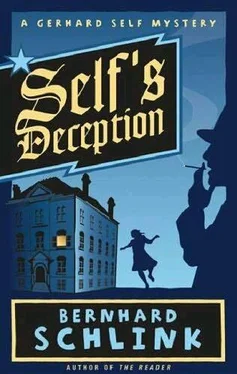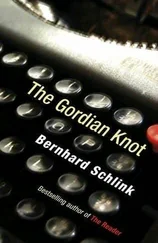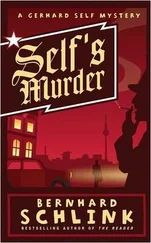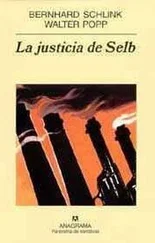“Trouble? What do you mean? Trouble, as in a patient falling out a window and breaking his neck?”
“Good God, no. I'm talking about small slipups and glitches. I guess 'trouble' isn't even the right word. It's things like a failure in the hot-water supply, food that's gone bad, workers finding windows they had stacked in the courtyard smashed, a patient being released a few days too late, an attendant falling from a ladder-I don't know if any of this is even significant. And the reports were never made by the management, but always by patients, their families, or anonymously. If only one didn't have to be so goddamn careful nowadays in wards and institutions…”
“Do the problems go beyond what happens in any large institution?”
Nägelsbach got up. “Follow me.” We went out into the corridor, turned around the corner, and looked out the window into the courtyard of the police headquarters. “What do you see, Herr Self?”
On the left, three police cars were parked, and on the right the ground was dug up and pipes were being laid. Some of the windows looking out on the yard were open, some closed. Nägelsbach looked up at the blue sky, across which a fresh wind was blowing little white clouds. “Wait a few more minutes,” he said. And then, as a cloud covered the sun, the blinds suddenly closed in all the windows. The cloud moved on, but the blinds remained closed.
“Of the three cars down there, two are almost always here because they need repairs, the sewer pipes have already been dug up once this year and then covered up again, and every summer the blinds come up with some new prank. Would you say that all this is within the bounds of what can happen in any large institution? Or is this the work of terrorists, liberationists, anarchists, or skinheads?” Nägelsbach looked at me blankly.
We went back to his office. “Do you have anything on a Dr.Wendt?”Iasked.
“One moment. The computer terminal is in another office.” He came back with a blank expression on his face. “There's nothing in the computer. But the name rings a bell. I don't know if that's for any specific reason. I'll have to look through the paper files that we'll be shredding for security reasons, which can't be pulled up on the computer. I'll try to do it as fast as I can, but it might take a while. When do you need this?”
I said “yesterday” and meant it. But what I had to do was clear even without a file on Wendt. Wendt was my lead, regardless of whether the lead was hot, warm, or cold. I had to dig up what sort of man he was, who his friends were, if he'd had dealings with Leo. Leo and her friends were not supposed to get wind of my investigation. But with Wendt I didn't have to mind my p's and q's.
I followed Wendt when he came out of the psychiatric hospital at about seven. He got into his car and drove off in the direction of Heidelberg. I'd been waiting for two hours and thrown my butts out the window because the ashtray was full. Sweet Aftons have no filter and are environmentally friendly cigarettes that burn out completely.
Route 3 is a smooth ride, and Wendt hit a good speed in his little Renault. From time to time I lost him, but caught up with him again at traffic lights, followed him down the Rohrbacher Strasse and through the Gaisberg tunnel, around Karlstor and up Hauptstraße. My Opel rattled over the cobblestones. We both parked in a garage beneath the Karlsplatz. Wendt pulled into a handicapped parking space, I into a well-lit parking space for women. Wendt got out of his car quickly, rushed up the stairs, and ran across the square, up Hauptstraße, past the Kornmarkt and the Heilig-Geist church. I couldn't keep up with him. His silhouette in the billowing beige raincoat grew smaller. I stopped at the corner of the city hall, pressing my hand to my side and trying to ease the pounding and stinging.
After the Florin-Gasse he hurried into a doorway over which hung a sign with a golden sun. I waited for the pounding in my side to grow weaker. The marketplace and the main street were quiet. It was too late for people to be shopping, and too early for strolling. On the houses around the marketplace a tax-advantaged historic renovation spree had left its mark. I noticed that in the niche at the corner of the city hall the stone statue of a prisoner of war was missing. He had stood there waiting for decades in a long coat, with hollow cheeks and emaciated hands. I wondered who might have taken him back home.
Beneath the sign of the golden sun was the Ristorante Sole d'Oro. I peeked inside. Wendt and a young woman were being given menus. Across the street, in the Café Bistro Villa, I found a table by the window where I could keep my eye on the restaurant's entrance. Long after the cassata, while I was on my second espresso and second sambuca, Wendt and his companion came out onto the street. They sauntered past a few houses to the Gloria movie theater. I watched the movie from three rows behind them. What I remember of the movie is the desperation of a woman who is becoming schizophrenic, and images of grand old facades, of a table festively decked on a terrace overlooking the sea, and of the sun hanging large and red in a hazy evening sky. As I came out of the theater I was dazed by the images and let my attention slip. Wendt and his companion were gone. A thick stream of students was moving down the main street, some with bright caps and headbands, along with American, Dutch, and Japanese tourists and loud young people from the provinces.
In the garage I waited for Wendt a long time. When he finally turned up, he was alone. He drove slowly: Friedrich-Ebert-Anlage, Kurfürstenanlage, along the Neckar River as far as Wieblingen. There he parked at the end of the Schuster-gasse. I couldn't make out the house number but saw him opening the garden gate and then closing it, walking around the house, and then disappearing down some stairs. Then the windows of the basement apartment lit up.
I drove home through the villages. The full moon cast its white light on fields and roofs. That night the moon kept me awake for a long time, and then I dreamed about it. It shone onto a terrace with a festively decked table, and I waited in vain for guests I had not invited.
One of the advantages of advancing years is that people believe everything you tell them. A man my age is simply too weary to try his hand as a con artist or a marriage swindler- what would he need the money for, anyway?
When I introduced myself as Wendt's father, his landlady didn't doubt my word for a minute.
“Ah, so you are Dr. Wendt's father!”
Frau Kleinschmidt eyed me inquisitively. Her flowery smock enclosed a good three hundred pounds, which protruded in small bulges between the buttons. The lower buttons had got in the way of her bending down and so were open, and her blue and pink petticoat peeked out. Frau Kleinschmidt had been busy with her strawberry beds when I had gone down the stairs to Wendt's basement apartment, rung the bell, and knocked on the door in vain. When I came back up the stairs, she had called me over.
I looked at my watch, and shook my head: “My son said he'd be home by five today. It's already a quarter past, and he's still not here.”
“He's usually never back before a quarter to seven.”
I sincerely hoped that today would be no exception. Twenty minutes earlier his car had still been parked outside the psychiatric hospital. I had taken up my post at four thirty, got fed up with waiting, and remembered the trustworthiness of the elderly. “I know he usually works till six or even later, but he told me he'd get away earlier today. I'm in Heidelberg on business and have to leave this evening. May I sit down on the bench for a moment?”
“I'll be happy to let you into your son's apartment. One moment; I'll go get the keys.”
Читать дальше












